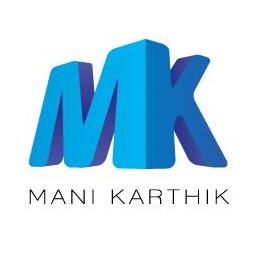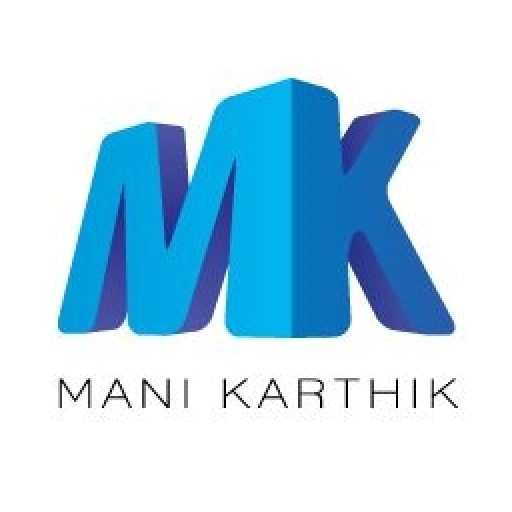How AI Is Revolutionizing Keyword Research

I’ll be honest with you – I’ve been doing keyword research for over a decade, and I thought I’d seen it all. Then 2024 happened.
Over 70% of marketers now rely on AI-powered keyword research tools to inform their SEO decisions, and after auditing dozens of SaaS companies this year, I can tell you why: the old way of doing keyword research is officially dead.
But here’s what most “AI keyword research” articles won’t tell you – this isn’t just about finding more keywords faster.
We’re witnessing a fundamental shift in how search engines understand intent, and the companies that get this right are seeing revenue increases of 3-15% and sales ROI uplifts of 10-20%.
Let me walk you through what’s actually changing and why it matters for your SaaS.
The Death of “Exact Match” Keyword Optimization
Remember when we’d create separate pages for “project management software,” “project management tool,” and “project management platform”?
Those days are over.
Search engines now interpret the meaning of words and phrases, returning content that matches the meaning of a query rather than literally matching words in the query.
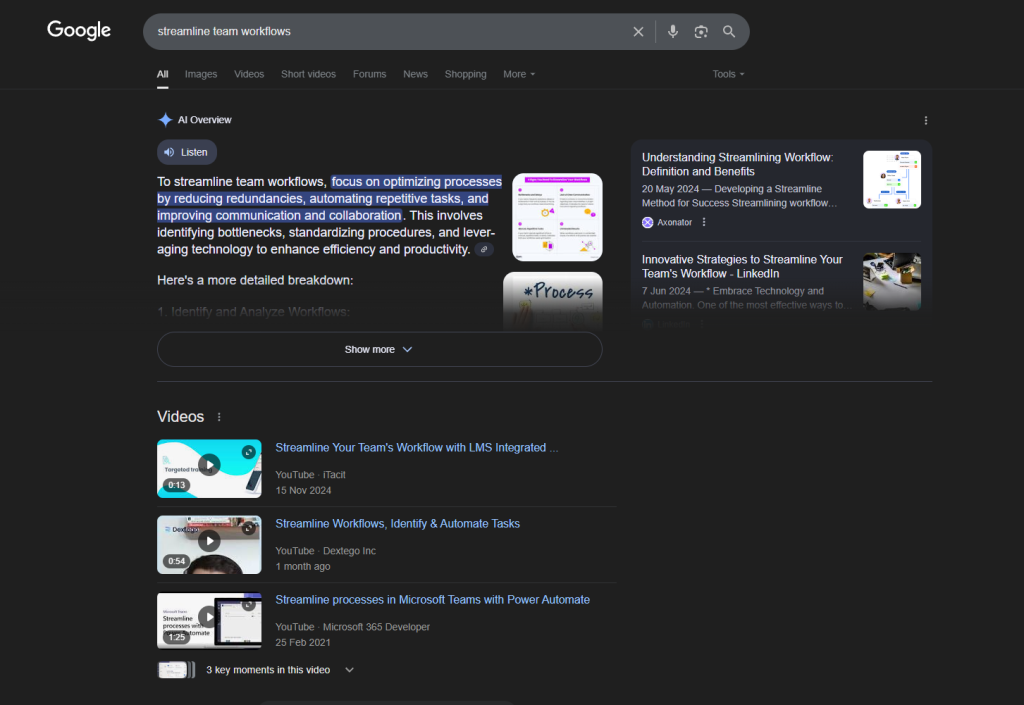
Google’s semantic search has evolved to understand that when someone searches for “streamline team workflows,” they might be perfect for your project management SaaS – even if you never used those exact words.
I recently worked with a client who was struggling to rank for competitive terms like “customer support software.”
Instead of fighting for those brutal keywords, we used AI tools to uncover semantic clusters around “reduce support ticket volume” and “automate customer responses.”
Result? They’re now ranking on page one for 47 related queries they never even targeted directly.
Tip: Stop thinking in individual keywords. Start thinking in semantic clusters. Your customers don’t search the way you think they do.
The New Metrics That Actually Matter
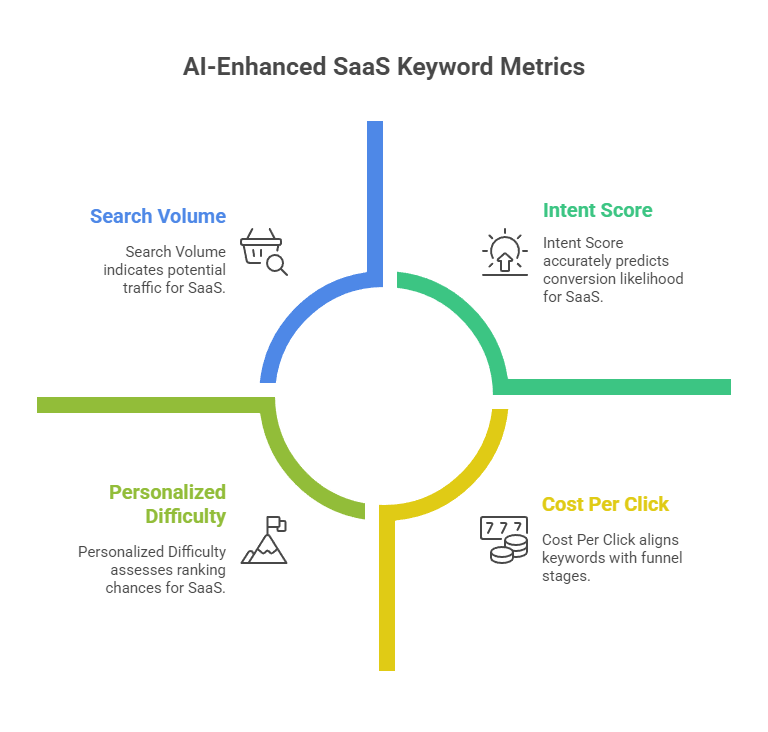
Traditional keyword research focused on three things: search volume, keyword difficulty, and cost-per-click. AI has introduced metrics that matter more for SaaS companies:
| Traditional Metrics | AI-Enhanced Metrics | Why It Matters |
|---|---|---|
| Search Volume | Intent Score + Topic Authority Potential | Shows conversion likelihood, not just traffic |
| Keyword Difficulty | Personalized Difficulty (based on your domain) | AI calculates YOUR chances of ranking |
| Cost Per Click | Customer Journey Stage Mapping | Aligns keywords with funnel stages |
AI tools now provide personalized difficulty scores based on your domain authority and existing content. This is huge for SaaS companies.
Instead of avoiding high-difficulty keywords, you might discover you have a real shot at ranking for them because of your existing topical authority.
How AI Is Democratizing Advanced Research
The most underrated benefit? AI has leveled the playing field for smaller SaaS companies.
AI-powered keyword research tools can process up to 10 times more keywords than traditional methods. What used to require a team of SEO specialists and expensive enterprise tools can now be done by a growth marketer with the right AI-powered setup.
The tools actually making a difference:

Their Keyword Magic Tool now uses AI to suggest personalized keywords based on your domain’s ranking potential. I’ve seen this uncover golden opportunities that human analysis missed.
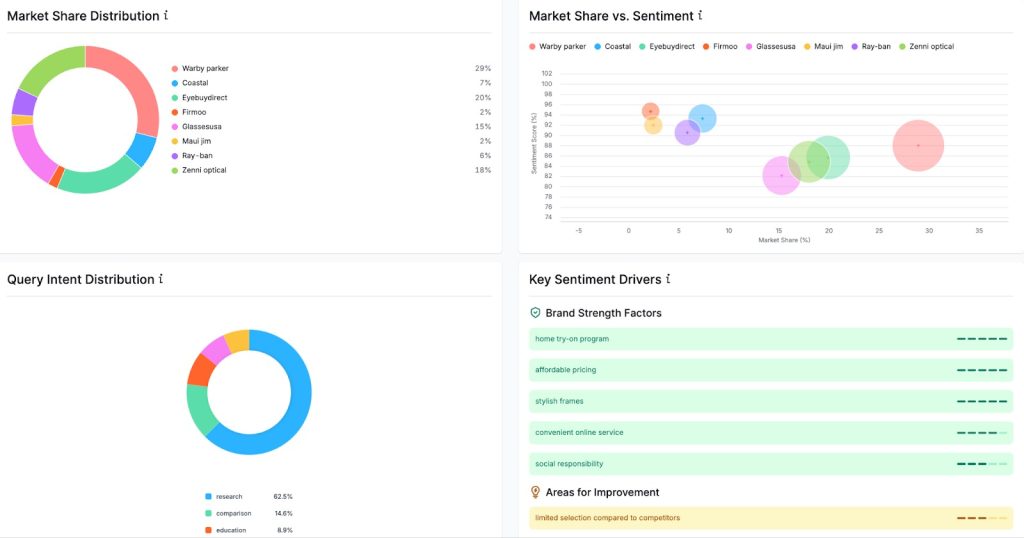
Goes beyond keyword suggestions to map out entire topic clusters and content gaps. Perfect for SaaS companies building thought leadership.
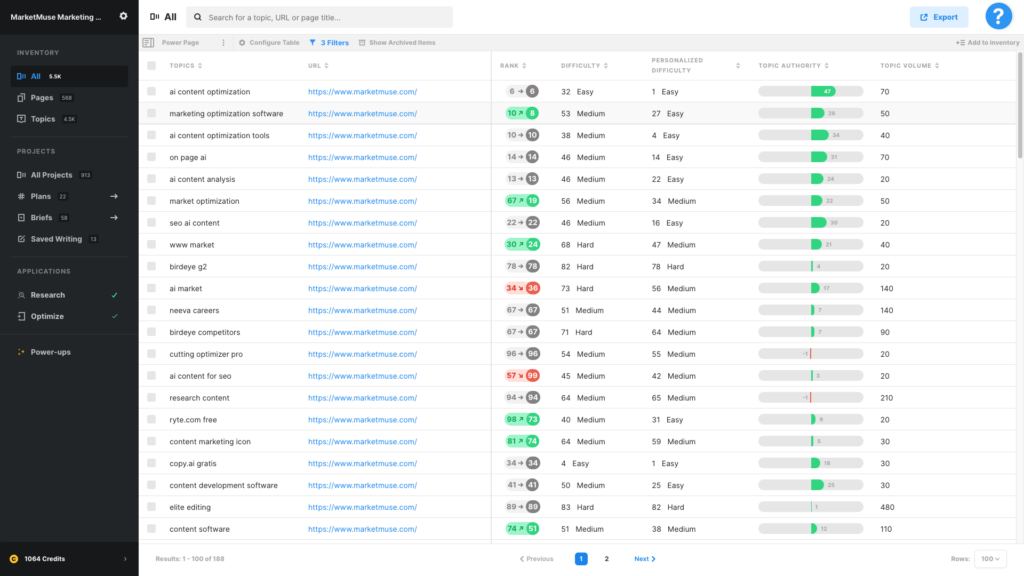
Surfer SEO’s Content Intelligence
Analyzes your existing content and suggests semantic terms that boost topical relevance without keyword stuffing.

The catch? Most companies are using these tools wrong.
The AI Research Framework That’s Actually Working
After testing this with 20+ SaaS clients, here’s the framework that consistently delivers results:
1. Start with Intent, Not Volume
Use AI to classify keywords by customer journey stage. Intent is now king – search engines are laser-focused on understanding the ‘why’ behind a search query.
Example: Instead of targeting “CRM software” (competitive, broad), we found “sync customer data between tools” converts 3x better for mid-market SaaS.
2. Map Semantic Relationships
AI tools excel at finding the connections humans miss. For a client selling team communication software, AI uncovered that people searching for “reduce email overload” were prime prospects – something traditional research never surfaced.
3. Analyze Competitor Content Gaps
AI can process competitor content at scale and identify topics they’re missing. This approach uncovers the full range of search language surrounding your topics, including semantic relationships that might be overlooked in manual brainstorming.
The AI-Powered Toolkit for Modern Keyword Research
Here’s the breakdown of tools that actually move the needle, organized by what you need to accomplish:
Intent Mapping & Journey Stage Analysis
| Tool | Best For | Key AI Feature |
|---|---|---|
| Search Atlas Keyword Magic Tool | Intent classification and semantic clustering | Automatically categorizes keywords by informational, navigational, commercial, and transactional intent |
| MarketMuse | Content planning around user intent | AI keyword clustering that connects topics semantically and analyzes current clusters for strengthening opportunities |
| Clearscope | Content optimization for search intent | AI-driven content scoring that ensures your content matches the intent behind target keywords |
Content Gap Analysis
Semrush Topic Research + AI Analytics – Goes beyond surface-level gaps to identify semantic opportunities your competitors missed.
The AI component analyzes not just what they’re ranking for, but what topics they should be covering based on their audience.
Frase.io – Uses AI to analyze the top 20 results for any keyword and identifies content gaps in real-time. Perfect for finding angles nobody else is covering.
Surfer SEO Content Editor – Real-time content gap analysis that suggests semantic terms and topics to include based on what’s currently ranking.
Semantic Keyword Discovery
SuperAGI’s Keyword Intelligence Suite – Leverages agent swarms to identify high-converting keywords across multiple channels. Their AI identifies keyword opportunities by analyzing industry trends and user behavior patterns.
ClickUp Brain – Generates related keyword ideas and builds keyword clusters within your content planning workflow. Integrates directly with project management for seamless execution.
Ahrefs Keywords Explorer with AI suggestions – Their AI component suggests semantically related keywords that share the same search intent, helping you build comprehensive topic clusters.
Advanced Competitive Intelligence
SpyFu AI Kombat – Analyzes competitor keyword strategies and uses AI to predict which of their keywords you have the best chance of stealing.
SE Ranking’s AI Writer + Keyword Research – Combines competitive analysis with AI-powered content suggestions, showing not just what competitors rank for, but how to create better content.
Voice & Conversational Search Optimization
AnswerThePublic + AI Analysis – While not purely AI, their recent updates include AI-powered insights into question-based queries that work well for voice search optimization.
AlsoAsked.com – Maps the “People Also Ask” questions and uses AI to identify conversational keyword patterns.
Tip: Don’t try to use every tool. Pick 2-3 that complement each other. Most successful SaaS companies I work with use Semrush for broad research, MarketMuse for content planning, and Surfer for execution.
The Free AI Options (That Don’t Suck)
Google’s Keyword Planner + Bard Integration – Google’s AI now provides better keyword suggestions within Keyword Planner, especially for understanding search intent.
ChatGPT/Claude for Semantic Expansion – While they don’t have real-time search data, they’re excellent for expanding keyword lists semantically.
Ask: “What would someone search for if they had [specific problem] but didn’t know [your solution] existed?”
Ubersuggest’s AI Writer – Their free tier includes AI-powered keyword suggestions based on content analysis.
The Numbers That’ll Make Your CFO Pay Attention
68% of businesses see improvement in their content marketing ROI due to AI, but here’s the breakdown that matters for SaaS:
- Time Savings: 75% of marketers leverage AI to reduce time spent on manual tasks like keyword research and meta-tag optimization
- Performance Lift: 75% of marketers have seen significant improvements in SEO rankings after adopting AI keyword research tools
- Content Quality: 67% notice improvement in content quality after using AI tools
One client reduced their keyword research time from 8 hours per week to 2 hours, while doubling their organic traffic growth rate. That’s not just efficiency – that’s competitive advantage.
The Hidden Opportunity: Voice and Visual Search
Here’s where most SaaS companies are missing out. AI tools have revolutionized how we conduct keyword research by analyzing vast amounts of data quickly and accurately, identifying emerging trends, and predicting keyword performance.
AI tools are already surfacing voice search patterns like “Hey Siri, find software that helps teams collaborate remotely.” These conversational queries often have lower competition and higher intent.
Quick win: Use AI to identify question-based keywords in your space. People ask AI assistants questions, not just search for products.
What’s Coming Next (And How to Prepare)
AI Overviews are triggered by 13.14% of all queries as of March 2025, up from 6.49% in January. This isn’t slowing down.
The SaaS companies winning in 2025 are optimizing for AI summaries, not just traditional rankings. That means:
- Creating content that answers complete questions, not just targets keywords
- Building topical authority across entire subject areas
- Focusing on user intent over search volume
The Reality Check
AI hasn’t made keyword research “easy” – it’s made it smarter. You still need strategy, understanding of your customers, and the ability to create content that actually helps people.
But if you’re still doing keyword research the 2020 way, you’re fighting with a stick while your competitors have machine guns.
Bottom line: Companies that use industry-specific keyword research tools see an average 20% reduction in cost per acquisition and a 15% increase in revenue. The question isn’t whether AI will change your SEO game – it’s whether you’ll adapt before your competitors do.
Need an honest assessment of where your keyword strategy stands in the AI era? Reach out – I’ll tell you exactly what’s working, what isn’t, and what to fix first.
